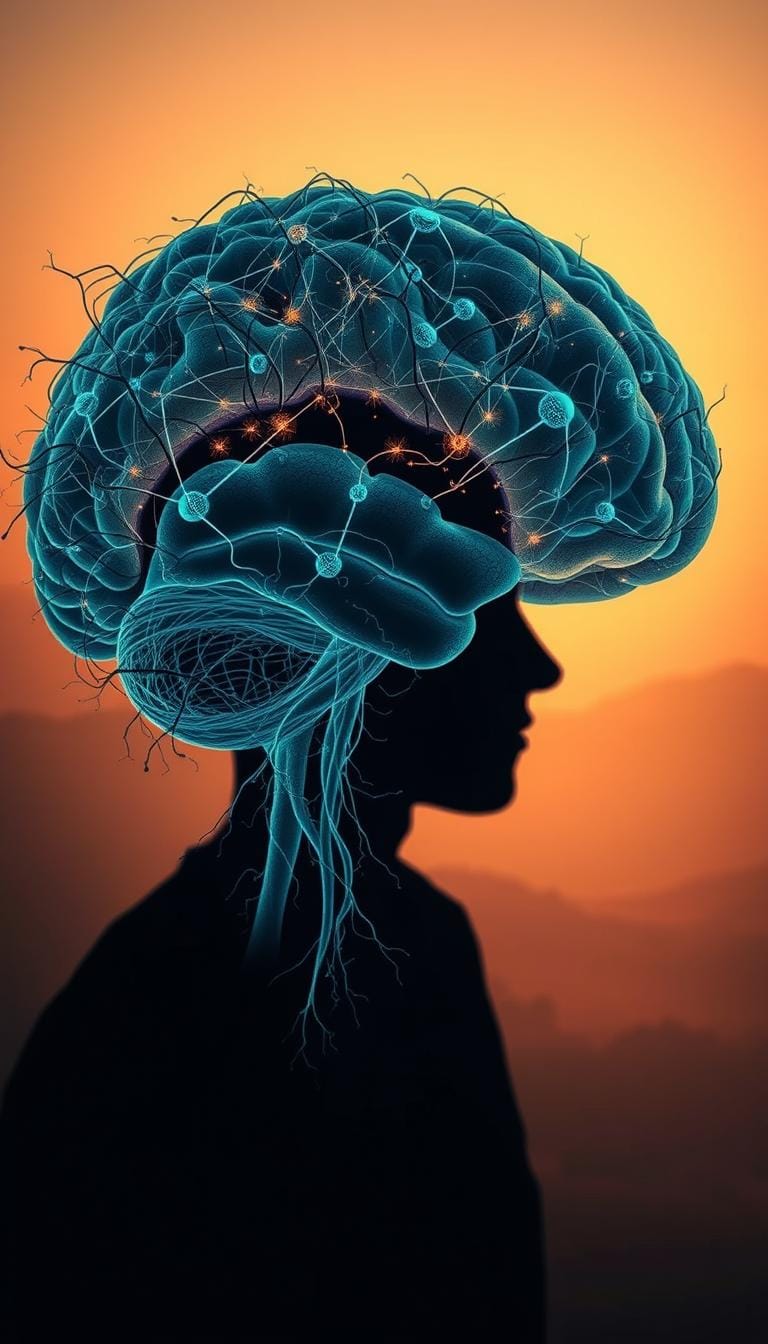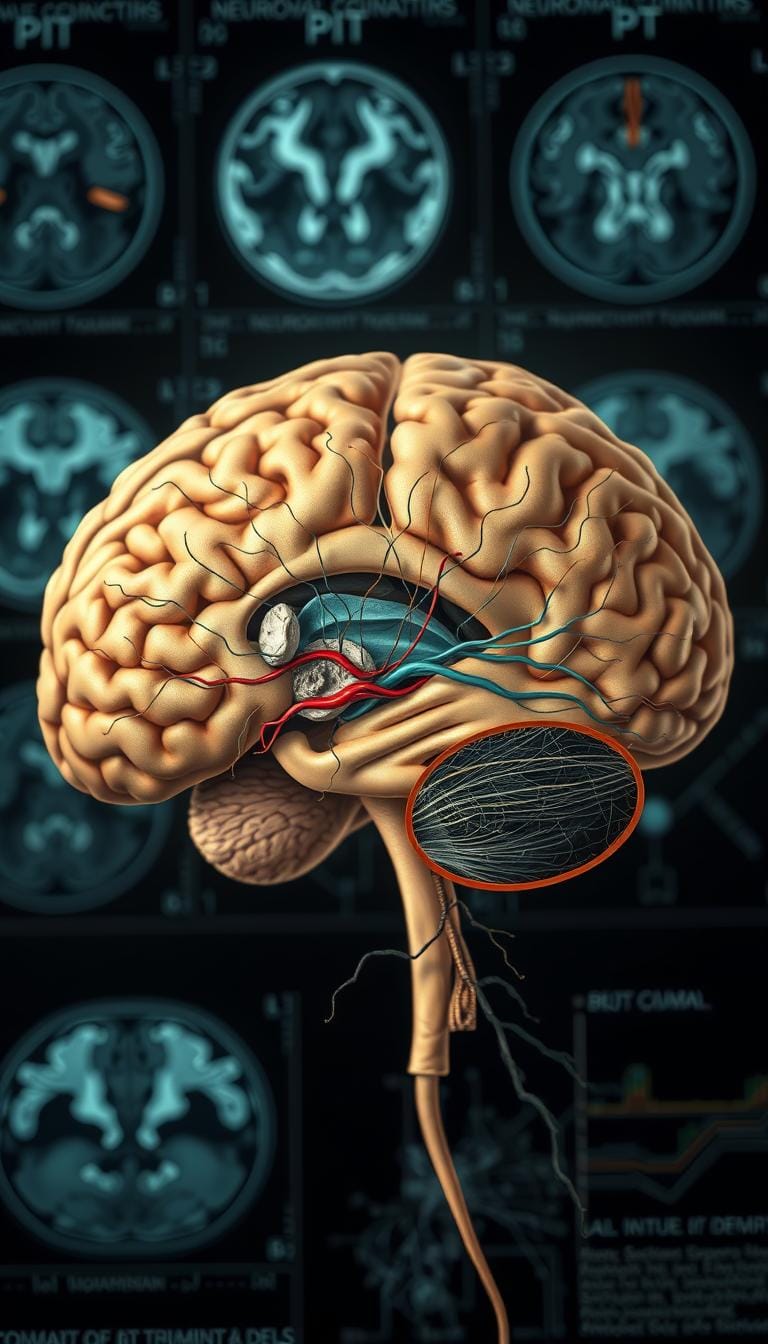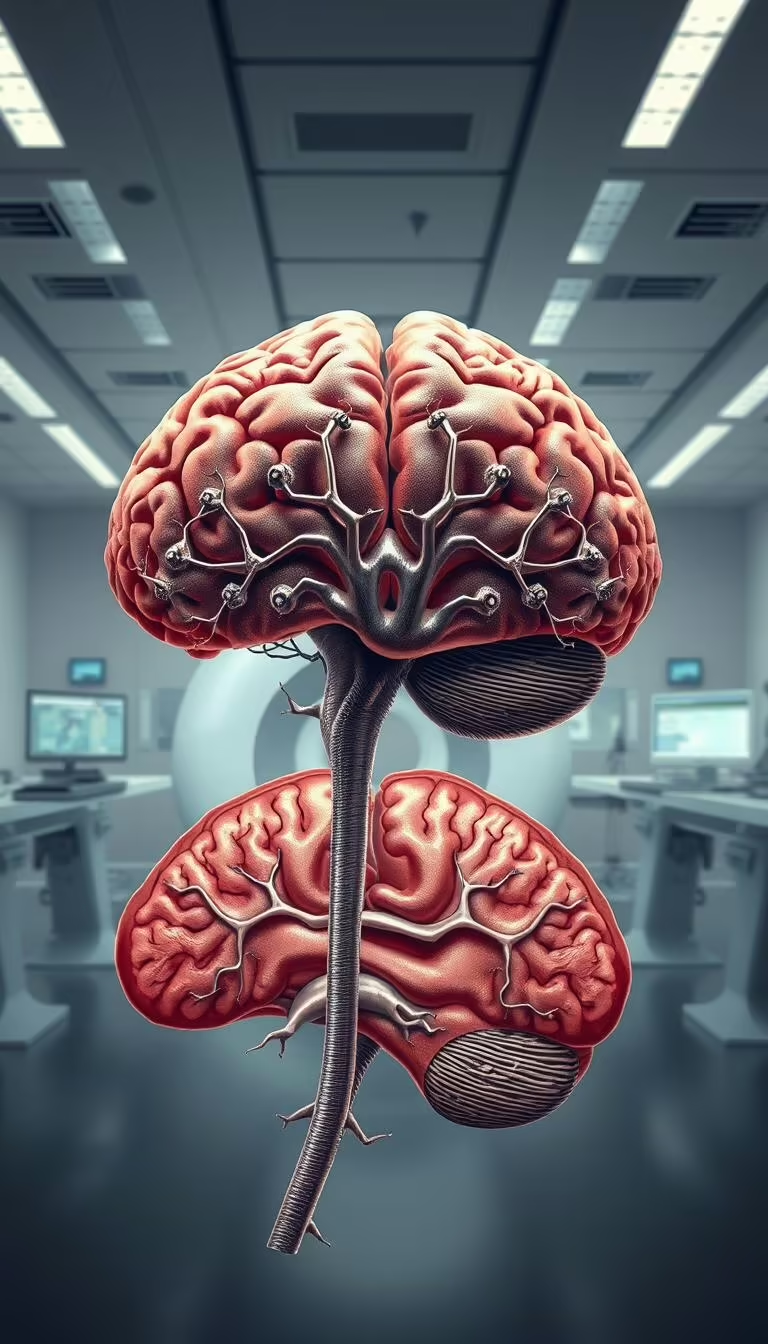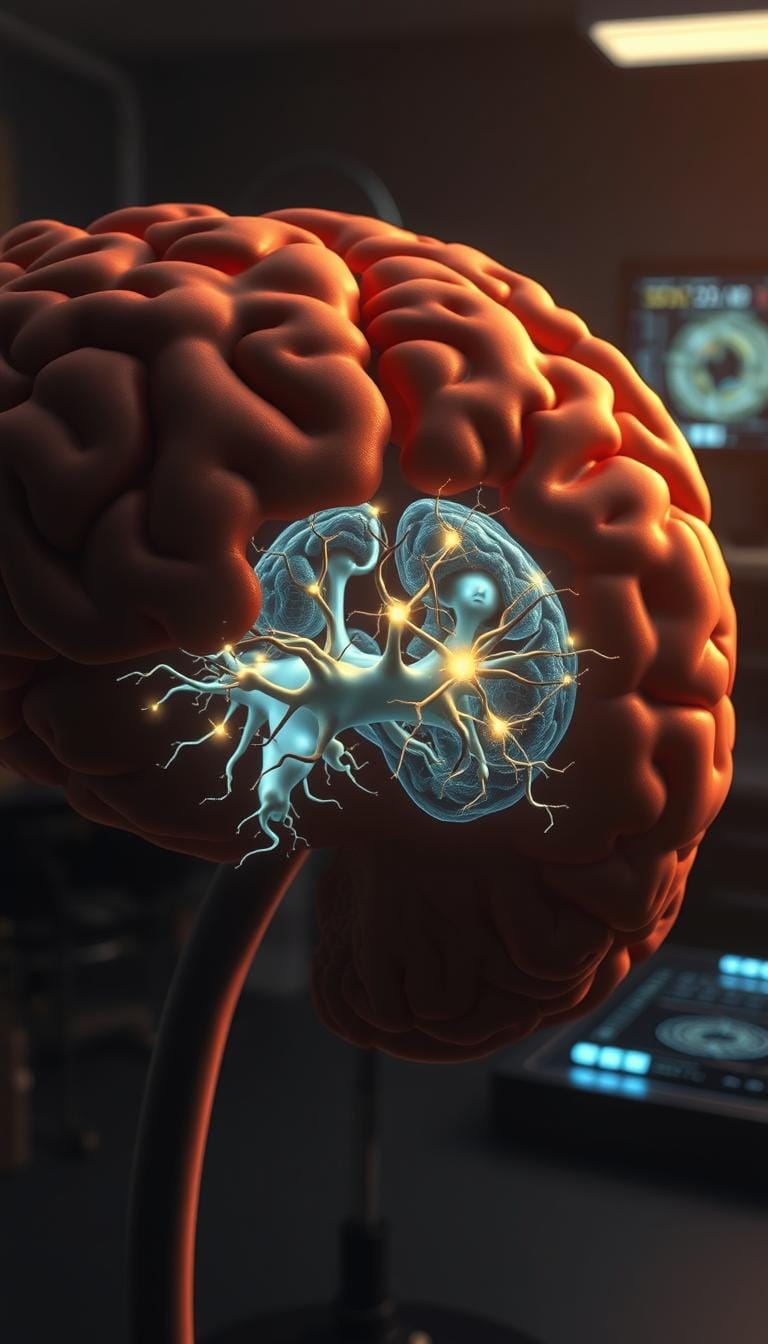How Chronic Stress Rewires the Brain: How to Heal in 4 Science-Backed Ways
Table of Contents
I’ve seen how chronic stress can hurt our bodies and minds. If we don’t deal with it, it can change how our brain works. This can lead to serious mental health problems.

Studies show that too much stress can mess with our brain’s mood control. This can make us feel more anxious and depressed. But, there are ways to fix this and make our brain healthy again.
In this article, we’ll look at four proven methods to fight chronic stress. These strategies can help our brain and improve our overall health.
The Hidden Toll of Chronic Stress on Your Brain
The human brain is designed to handle stress, but chronic stress can harm it. We usually talk about stress’s immediate effects. But chronic stress, lasting over time, affects our brain health deeply.
What Makes Stress “Chronic”?
Stress is chronic when it lasts for a long time. This can be due to work, money, or personal problems. The constant presence of stress hormones like cortisol changes our brain’s chemistry and function.
For example, chronic stress can change how our brain responds to stress. This makes it harder to deal with stress in the future.
The Difference Between Acute and Chronic Stress Responses
Acute stress is a quick response from our body’s “fight or flight” system. It’s meant to be short-lived. On the other hand, chronic stress keeps this system on for too long. This wears down our brain and body.
The table below shows the main differences between acute and chronic stress responses.
| Characteristics | Acute Stress | Chronic Stress |
|---|---|---|
| Duration | Short-term | Long-term |
| Impact on Brain | Temporary alertness | Lasting changes in brain chemistry and structure |
| Body’s Response | “Fight or flight” response | Prolonged activation of stress response system |

It’s important to know the difference between acute and chronic stress. Recognizing chronic stress is the first step to managing it. This helps protect our brain.
How Chronic Stress Rewires the Brain: The Neurological Impact
Chronic stress changes the brain in many ways. It affects our stress response and even the structure of our brain. Knowing these changes helps us find ways to fight the bad effects of chronic stress.
The Brain’s Stress Response System
The brain’s stress system is controlled by the HPA axis. When we’re stressed, the HPA axis kicks in, releasing stress hormones like cortisol. Cortisol is key in how our body handles stress, affecting things like metabolism and brain function.
Neural Pathways Altered by Prolonged Stress
Stress over time changes our brain’s pathways. This affects how we handle information and react to our surroundings. The amygdala, important for emotions, gets too active, while the prefrontal cortex, which helps us make decisions, gets weaker.
Long-term Structural Changes in Brain Tissue
Chronic stress can change our brain’s structure for the long term. It can shrink certain brain areas. Studies show that stress can shrink the hippocampus, which is key for memory and learning.
| Brain Region | Impact of Chronic Stress |
|---|---|
| Hippocampus | Reduced volume, impaired memory and learning |
| Amygdala | Hyperactivity, heightened emotional responses |
| Prefrontal Cortex | Impaired function, reduced decision-making capabilities |

Understanding these changes is the first step to healing. By knowing how chronic stress affects our brain, we can start to find ways to improve our brain health.
The Cortisol Connection: Your Brain’s Chemical Transformation
Chronic stress sets off a chain of physical reactions, with cortisol leading the way. Exploring stress hormones reveals cortisol’s wide-ranging effects on our brain.
How Cortisol Affects Brain Structure and Function
Cortisol, known as the “stress hormone,” is key in our stress response. Elevated cortisol levels can change brain structure and function. It impacts areas like the hippocampus, prefrontal cortex, and amygdala.
This can alter memory, decision-making, and emotional control.
The effects of cortisol on brain structure are alarming. Prolonged cortisol exposure can shrink certain brain areas. This harms cognitive and emotional health.
| Brain Region | Effect of Cortisol | Potential Consequences |
|---|---|---|
| Hippocampus | Reduced volume | Memory impairments |
| Prefrontal Cortex | Impaired function | Decision-making difficulties |
| Amygdala | Heightened activity | Increased emotional responses |
The Vicious Cycle of Stress Hormones
The link between cortisol and stress is a cycle. Stress causes cortisol release, and high cortisol can keep stress going. This cycle can change brain chemistry and function, making stress hard to manage.
To break this cycle, we need a full approach. It must tackle both physical and mental stress aspects. Understanding cortisol’s role in chronic stress helps us find ways to lessen its brain impact.
Key Brain Regions Damaged by Chronic Stress
Chronic stress changes our brain, affecting areas like the hippocampus, prefrontal cortex, and amygdala. These changes impact our thinking and feelings deeply.
Hippocampus: Memory Center Under Attack
The hippocampus is key for making new memories. Chronic stress weakens it, affecting memory and raising the risk of memory loss.
Prefrontal Cortex: Decision-Making Difficulties
The prefrontal cortex helps us make decisions and solve problems. Chronic stress damages it, making these tasks harder.
Amygdala: Heightened Emotional Responses
The amygdala handles emotions. Chronic stress makes it overactive, leading to more anxiety and fear.
Impact on Brain Connectivity
Chronic stress harms not just brain areas but also how they connect. This disrupts brain communication, worsening cognitive and emotional issues.
| Brain Region | Function | Effect of Chronic Stress |
|---|---|---|
| Hippocampus | Memory formation | Reduced volume, impaired memory |
| Prefrontal Cortex | Decision-making, executive function | Weakened neural connections, decision-making difficulties |
| Amygdala | Emotional processing | Hyperactivity, heightened emotional responses |
Recognizing the Warning Signs of Stress-Induced Brain Changes
Chronic stress can harm the brain, showing signs of damage. It’s key to notice these changes early. This way, you can act fast to protect your brain health.
Stress can change how we think, feel, and act. Spotting these changes early helps manage stress better. It also helps keep your brain healthy.
Cognitive Symptoms to Watch For
Cognitive symptoms are often the first signs of brain changes from stress. Look out for:
- Memory problems: Trouble remembering words, names, or events.
- Concentration issues: Struggling to stay focused or make decisions.
- Mental fogginess: Feeling disorganized or unclear in your thoughts.
Emotional and Behavioral Red Flags
Stress can also change how we feel and act. Watch for:
- Mood swings: Sudden mood changes, like getting easily upset or anxious.
- Increased emotional reactivity: Reacting more strongly to stressful situations.
- Changes in behavior: Noticeable changes in appetite, sleep, or social behavior.
The Science of Neuroplasticity: Your Brain Can Heal
Neuroplasticity brings hope to those dealing with chronic stress. It shows that our brains can change and adapt. This is vital for healing from stress’s harm.
Understanding Brain Recovery Mechanisms
The brain heals from stress through complex ways. It grows new neurons and strengthens connections. Lifestyle and environment play big roles in this healing.
The Timeline for Neural Repair
How fast the brain heals varies. It depends on the stress’s length and intensity, and the recovery efforts. Studies say the brain can start to heal in a few months. Being patient and persistent is important.
Science-Backed Healing Strategy #1: Mindfulness Meditation
Mindfulness meditation is a great way to fight chronic stress’s harm to the brain. It helps you stay in the moment and be aware without judgment. This can start to heal your brain from stress’s damage.
How Meditation Rebuilds Brain Tissue
Mindfulness meditation helps with managing chronic stress for brain health. It makes the brain’s grey matter grow in important areas. This is key for recovering from stress’s harm.
Research on Meditation and Stress Reduction
Many studies show mindfulness meditation reduces stress and boosts brain health. It lowers cortisol and makes the brain more resilient to stress. It also helps with anxiety and depression symptoms.
| Benefits of Mindfulness Meditation | Impact on Brain Health |
|---|---|
| Reduces stress and anxiety | Lowers cortisol levels, enhances stress resilience |
| Increases grey matter | Improves attention, emotion regulation, and memory |
| Enhances cognitive function | Improves focus and mental clarity |
Implementing a Brain-Healing Meditation Practice
To start, begin with short meditation sessions and gradually increase them. Being consistent is important for managing chronic stress for brain health.
Beginner-Friendly Meditation Techniques
For beginners, try body scan, mindful breathing, and guided meditation. These techniques help you focus and reduce distractions.
Establishing a Sustainable Routine
To keep meditation a regular part of your life, practice often and be patient. Even a few minutes each day can help with stress and brain health.
Science-Backed Healing Strategy #2: Exercise for Neural Regeneration
Exercise is a powerful tool for those looking to fight chronic stress’s effects on their brain. It helps grow new brain cells and makes the brain stronger. This counters the harm stress can do to the brain.
The BDNF Connection: How Movement Grows Brain Cells
Exercise boosts Brain-Derived Neurotrophic Factor (BDNF), a key protein for brain health. Higher BDNF levels mean better brain function and flexibility. This helps the brain heal from stress damage.
Research on Exercise and Brain Health
Many studies show exercise’s benefits for the brain, even under chronic stress. It improves thinking skills and boosts stress resistance. This is thanks to the brain’s ability to adapt and heal.
Optimal Exercise Types and Durations for Brain Health
There are various exercises that benefit the brain in different ways. Knowing which ones to do can help maximize brain health.
Aerobic Exercise Benefits
Aerobic activities like running or cycling are great for the heart and brain. Regular aerobic exercise can greatly improve brain function and stress handling.
Strength Training and Brain Recovery
Strength training also supports brain health. It improves overall physical health, which indirectly helps the brain recover and become more resilient.
Science-Backed Healing Strategy #3: Sleep Optimization for Brain Recovery
Sleep is key to healing the brain from chronic stress. It plays a big role in brain recovery. Getting enough sleep helps us manage stress better.
Clearing Stress Damage Through Sleep
Sleep helps clear stress damage. During sleep, the brain repairs and rejuvenates itself. It gets rid of harmful waste, like beta-amyloid plaques linked to Alzheimer’s.
The Role of Research in Understanding Sleep and Stress Resilience
Research links sleep to stress resilience. People who sleep well handle stress better. Lack of sleep boosts stress hormones, harming brain health.
Creating a Sleep Routine for Optimal Brain Healing
Having a sleep routine is vital for brain healing. It’s not just about how long you sleep but also how well. Here are some tips:
Optimal Sleep Duration and Quality
Adults need 7-9 hours of sleep each night for brain health. Quality sleep matters too. Sleep disorders can hurt sleep quality.
Techniques to Improve Sleep When Stressed
Stress can make it hard to sleep. Mindfulness, muscle relaxation, and CBT-I can help. A consistent sleep schedule and a good sleep environment are also key.
| Sleep Technique | Description | Benefit |
|---|---|---|
| Mindfulness Meditation | Practice mindfulness before bed | Reduces stress and anxiety |
| Progressive Muscle Relaxation | Relax muscle groups progressively | Promotes relaxation |
| CBT-I | Cognitive behavioral therapy for insomnia | Addresses underlying sleep issues |
Optimizing sleep is a big step towards managing stress and improving brain health. It’s about making a sleep routine that works and sticking to it, even when life gets busy.
Science-Backed Healing Strategy #4: Nutritional Support for Brain Repair
Nutritional support is key in healing from chronic stress. What we eat affects our brain health a lot. Making smart food choices helps our brain recover and stay strong.
Anti-inflammatory Foods That Combat Stress Damage
Eating foods that fight inflammation is important. Omega-3 rich foods like salmon help reduce brain inflammation. Berries and leafy greens also protect the brain from stress.
Key Nutrients That Support Neurogenesis
Some nutrients are vital for creating new brain cells. B vitamins, like B6, B9, and B12, help make neurotransmitters. Magnesium and zinc also support brain health.
Creating a Brain-Healing Meal Plan
Creating a meal plan for brain health means eating a variety of whole foods. Include fruits, veggies, whole grains, lean proteins, and healthy fats. This gives your brain what it needs to heal and stay strong.
Daily Nutrition Habits for Stress Resilience
To build stress resilience, eat a balanced diet of whole foods. Drink plenty of water and avoid processed and sugary foods. Try to eat foods of all colors to get a wide range of nutrients.
Foods to Avoid That Worsen Stress Impact
Some foods can make stress worse for your brain. Avoid foods high in sugar, refined carbs, and unhealthy fats. They can cause inflammation and stress. Knowing what to avoid helps manage stress better.
Conclusion: Your Roadmap to a Stress-Resilient Brain
Chronic stress can change the brain’s structure and function. It’s important to know how it affects the brain to improve stress and brain health.
Using four science-backed strategies can help. These include mindfulness meditation, regular exercise, better sleep, and good nutrition. They help the brain heal and become more resilient.
These methods work together to lessen the harm of chronic stress on the brain. They improve brain health and help you become more stress-resistant.
Adding these strategies to your daily life can help heal and keep your brain healthy. This can greatly improve your overall well-being.
Disclaimer: This content is for informational purposes only and does not substitute professional medical or therapeutic advice. Always consult a qualified health provider.






